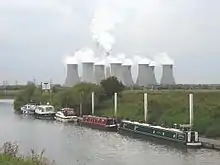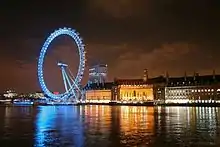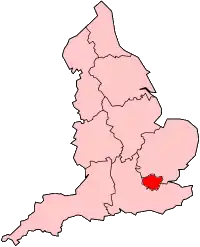EDF Energy
EDF Energy is a British integrated energy company with operations spanning electricity generation and the sale of natural gas and electricity to homes and businesses throughout the United Kingdom. It employs 13,331 people, and handles 5.7 million customer accounts.[1] [2] [3]
 | |
| Type | Subsidiary |
|---|---|
| Industry | Energy |
| Founded | 2002 |
| Headquarters | London, England, United Kingdom |
Key people | Simone Rossi (CEO) |
| Products | Natural gas Electricity |
| Revenue | |
Number of employees | 13,331[1] |
| Parent | Électricité de France |
| Website | www |
History
EDF Energy Customers (trading as EDF Energy) is wholly owned by the French state owned EDF[4] (Électricité de France) and was formed in January 2002, following the acquisition and mergers of SEEBOARD Plc (formerly the South Eastern Electricity Board), London Electricity plc (formerly the London Electricity Board or LEB), SWEB Energy Plc (formerly the South Western Electricity Board) and two coal fired power stations and a combined cycle gas turbine power station.
In 2009, EDF Energy took control of the nuclear generator in the United Kingdom, British Energy, buying share capital from the government. This made EDF Energy one of the largest generators in the United Kingdom,[3] as well as the largest distribution network operator.
The Development Branch of EDF Energy was formed in April 2004, bringing together the separate infrastructure interests of what were LE Group, SEEBOARD and SWEB. The focus for the Branch is development activity through the participation in major new infrastructure projects, largely in the public sector through Public-private partnership (PPP) and Private Finance Initiative (PFI) type schemes. The Development Branch of EDF Energy was later dissolved in October 2006.
The electricity distribution (or downstream) networks formerly known as EDF Energy Networks were sold in November, 2010 to Hong Kong-based Cheung Kong Group (CKG), owned by billionaire Li Ka Shing. Later, EDF Energy Networks was renamed to UK Power Networks. In December 2014, EDF sold three small United Kingdom based wind farms with a combine capacity of 73 megawatts to the China General Nuclear Power Group for an estimated £100 million.[5]
In November 2017, EDF Energy sold its majority stake in five wind farms across Cambridgeshire and Lincolnshire for £98 million.[6]
A release from EDF Energy confirmed that in 2018 the firm lost 200,000 as consumers shop around a highly competitive marketplace. EDF also found that earnings for its UK business had tumbled by 16.5% to £691 million in the year to 31 December.[7]
No Dash For Gas action
In February 2013, EDF Energy sought an estimated £5 million in damages from environmental activists from the No Dash for Gas campaign, who occupied the EDF owned West Burton CCGT power station in October 2012, and pleaded guilty to charges of aggravated trespass.[8][9]
It is unusual in the United Kingdom for companies to seek damages from protesters.[10] Environmentalist George Monbiot, writing in the Guardian, said EDF was conducting a strategic lawsuit against public participation, "part of a global strategy by corporations to stifle democracy", and predicted the "disastrous unintended consequences of an attempt at censorship" could result in the Streisand effect and be comparable to the McLibel case.[11]
The activists received support in the days since the case became public, with over six thousand signatures on a supportive petition at Change.org within the first day, and over 64,000[12] by the time EDF dropped their lawsuit on 13 March 2013, saying that this was "a fair and reasonable solution" after the protesters had "agreed in principle to accept a permanent injunction which prevents them from entering multiple sites operated by EDF Energy".[13]
Electricity generation
Fossil fuel

EDF owns and operates one 2,000 MW coal fired power station, West Burton Power Station, located near Retford in Nottinghamshire,[14][15]
It also owns a 1,311 MW CCGT station at West Burton, which opened in 2011.[16]
Wind
EDF owns and operates three wind farms, at Kirkheaton in Northumberland and the High Hedley Hope wind farm near Tow Law in County Durham, and the Teesside Offshore Wind near Redcar, Teesside.[17]
Nuclear
Following the acquisition of British Energy in 2009, the EDF Energy portfolio includes eight nuclear power stations. They are seven AGR power stations (Dungeness B; Hinkley Point B; Hunterston B; Hartlepool; Heysham 1; Heysham 2 & Torness) and one PWR power station (Sizewell B), totalling nearly 9,000 MW of installed capacity.
In 2007, EDF announced its intention to construct up to four new EPR reactors;[18] two at Hinkley Point C (currently scheduled to start operation in 2025[19]) and two at Sizewell C. EDF plans to build and operate the new plants through its subsidiary NNB Generation Company (NNB GenCo).
In August 2014, the company announced it had shut down four of its 15 reactors for a period of eight weeks to investigate potential cracking in the boiler spine.[20] In 2015, EDF announced a ten-year life extension for Dungeness B, pushing back the closure date until 2028.[21] In February 2016, EDF announced that it would keep four of its nuclear plants open in the United Kingdom. Heysham 1 and Hartlepool will have their life extended by five years until 2024, while Heysham 2 and Torness will see their closure dates pushed back by seven years to 2030.[22]
Renewable energy
The Ecologist magazine[23] reported that in 2004, EDF Energy spent virtually nothing on the construction of new renewable energy generation. On their website EDF reports that it is currently investing GBP 2 million in Marine Current Turbines,[24] which use tidal power to generate electricity; however, these turbines are still at the research and prototype phase and EDF expect them to be operational "within the next five years" dependent upon "a successful pilot."[24] EDF also has several ongoing renewable developments in windfarms.[25]
In 2007, EDF had an installed renewable energy generating capacity of 1.8MW, representing 0.08% of their total capacity of approximately 4,865MW.[26] In June 2008, EDF announced the formation of EDF Energy Renewables, a 50:50 joint venture with EDF Energies Nouvelles, with the stated intention of becoming a 'major force in the United Kingdom renewable energies market'.[27]
In July 2009, Ecotricity started legal proceedings[28] against EDF Energy for the alleged misuse of the Green Union Flag logo, used to promote the Team Green Britain campaign. In April 2013, the 62 MW offshore Teesside Wind Farm started operation.[29]
Sponsorship

EDF Energy has sponsored several shows on ITV, including Soapstar Superstar and City Lights. It also sponsored coverage of the 2006 World Cup in Germany (shared with Budweiser) and coverage of the 2007 Rugby World Cup (shared with Peugeot)
Since 2005, EDF Energy has been the main sponsor of the EDF Energy Cup – the Rugby Union domestic cup for the twelve clubs in the English Premiership and the four Welsh regions – also known as the Anglo-Welsh Cup. In July 2007, EDF Energy was confirmed as another Level One sponsor for London 2012 with exclusive branding rights and Olympic team sponsorship for the 2008, 2010 and 2012 games as well as being the official energy provider.
In August 2008, EDF Energy formed a partnership with The British Red Cross to help vulnerable people to get support during power failures.[30] In January 2011, EDF Energy took over sponsorship from British Airways of the London Eye, on a three-year deal renaming the London Eye as the EDF Energy London Eye.[31]
Marketing
On 4 January 2008, EDF Energy began advertising on the television through ITV, Channel 4, Channel 5 and various Satellite channels. EDF Energy are using "It's not easy being green" as their slogan to target a new greener eco friendly image.[32] In 2009, with Euro RSCG London, EDF Energy created the Team Green Britain campaign, in which Olympic athletes encouraged Britons to be more environmentally aware.[33]
On 2 April 2012, EDF Energy launched an advert, including their new mascot, Zingy.
Distribution network operators
EDF Energy is an energy supplier for homes across the country. They are not however a distribution network operator.[34]
EDF Energy's main locations
EDF Energy's main offices are located in London, Croydon, Exeter, Sunderland, Hove, Crawley and Barnwood.
See also
References
- https://www.edf.fr/sites/default/files/contrib/groupe-edf/espaces-dedies/espace-finance-fr/informations-financieres/informations-reglementees/document-de-reference/edf-ddr_2016-en.pdf
- "EDF Group 2007 Annual Report, PDF page 72" (PDF). EDF Group.
- "About British Energy". British Energy.
- "Shareholder Information". EDF Energy.
- "China's CGN to buy three small UK wind farms from EDF" (Press release). Reuters. 15 December 2014.
- "EDF sells majority stake in five UK wind farms". businessgreen.com. Retrieved 21 November 2017.
- "Energy consumers shop around as 200,000 leave EDF energy". www.consultancy.uk. Retrieved 24 July 2019.
- Garvin, Daniel (21 February 2013). "How to occupy a power station: exclusive footage of No Dash For Gas as they prepare to shut down the West Burton plant – video". The Guardian. Retrieved 1 March 2013.
Environmental activists No Dash For Gas occupied two 300ft chimneys at the EDF-owned gas-fired power station in West Burton, Nottinghamshire, in November 2012. Exclusive footage shows the group's meticulous preparation for the action. They closed the facility for eight days – the longest occupation of a power plant in the United Kingdom. Protesters reject government plans to invest heavily in new gas power stations and instead call for massive investment in renewables
- "Press release: EDF suing climate activists for £5 million – protesters face losing homes". No Dash for Gas. 20 February 2013. Archived from the original on 23 April 2013. Retrieved 27 February 2013.
Following the week-long shut-down and occupation of EDF's West Burton gas-fired power station last October by campaign group 'No Dash for Gas', EDF has launched a civil claim for damages against the group and associated activists for costs the company claims to have incurred – a figure it puts at £5 million
- Ball, James (20 February 2013). "Activists claim police siding with power company EDF in lawsuit". The Guardian. Retrieved 27 February 2013.
The action includes an injunction barring those named from the site, but – in an unusual move in the UK – also has a provision to recover damages, interest, and court costs from the activists. ... John Sauven, the executive director of Greenpeace ... "EDF's lawsuit represents the opening of a new front against peaceful protest"
- Monbiot, George (25 February 2013). "Will EDF become the Barbra Streisand of climate protest?". The Guardian. Retrieved 1 March 2013.
The energy giant is part of a global strategy by corporations to stifle democracy. ... The Streisand effect, in other words, is blowback: disastrous unintended consequences of an attempt at censorship. ... The best-known example is Britain's famous McLibel case, in which McDonald's tried to sue two penniless activists. ... EDF might find itself in similar trouble.
- Read, Simon (14 March 2013). "Energy giant EDF drops lawsuit against climate change protesters after backlash". The Independent. Retrieved 14 March 2013.
Campaigners claimed the climb down as a major victory after a backlash in which hundreds of customers deserted the company and 64,000 people signed an online petition.
- Ball, James (13 March 2013). "EDF drops lawsuit against environmental activists after backlash". The Guardian. Retrieved 14 March 2013.
- "Generating energy". Retrieved 25 October 2017.
- – Department of Energy and Climate Change 'Digest of UK energy statistics' (DUKES) Archived 28 August 2011 at the Wayback Machine
- West Burton Combined Cycle Gas Turbine Station, EDF Web Site
- "Generating energy". Retrieved 25 October 2017.
- "EDF Group 2007 Annual Report, PDF page 74" (PDF). EDF Group.
- Point, Hinkley (21 October 2015). "Press release: Agreements in place for construction of Hinkley Point C nuclear power station". EDF Energy. Retrieved 30 March 2017.
- "Defect in UK nuclear plant boiler leads EDF Energy to shut four reactors". Business Sun. 11 August 2014. Retrieved 13 August 2014.
- "UK nuclear plant gets ten-year extension". World Nuclear News. 20 January 2015. Retrieved 21 January 2015.
- Moylan, John (16 February 2016). "EDF to keep four UK nuclear plants open for years longer – BBC News". BBC News. Bbc.com. Retrieved 30 March 2017.
- "Green Electricity… Are you being conned". The Ecologist. 1 June 2005. Archived from the original on 29 June 2007.
- "EDF Energy powers Marine Current Turbine's First Commercial Prototype". EDF Website. 3 January 2006.
- "EDF Renewables Generation & Development". Performance Report 2005.
- "EDF Group 2007 Annual Report, PDF page 75" (PDF). EDF Group.
- "EDF Energies Nouvelles and EDF Energy to form joint venture in the United Kingdom". Retrieved 25 October 2017.
- "Exclusive: Ecotricity threatens legal action against EDF in green Union flag row". 6 July 2009. Retrieved 25 October 2017.
- Andrew Lee (30 April 2013). "First power from EDF's Teesside". Recharge. Retrieved 30 April 2013.
- "News – British Red Cross". www.redcross.org.uk. Archived from the original on 26 October 2017. Retrieved 25 October 2017.
- EDF Energy website, accessed 7 August 2012 Archived 11 July 2012 at the Wayback Machine
- "Save today, Save tomorrow, EDF Energy". Retrieved 27 February 2013.
- "How to save energy ? – Electricity and Gas Saving Tips". Retrieved 25 October 2017.
- "The GB electricity distribution network". 18 June 2013. Retrieved 4 August 2014.
